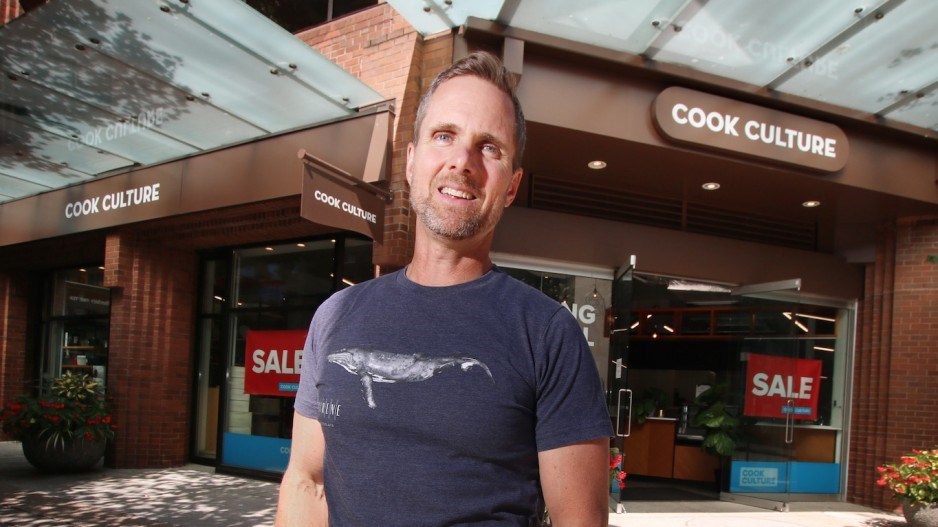Longtime Vancouver cookware store owners Jed and Regan Grieve plan to close their Cook Culture store at 377 Howe Street at the end of August, and shift to e-commerce sales.
The duo's bricks-and-mortar store in Victoria will stay open for now.
Their move out of a physical footprint in Vancouver comes as retail executives across the sector strategize and try to determine how much capital to allot to bricks-and-mortar operations compared with digital ones.
Even retail executives whose ventures are entirely online have found themselves grappling with hard decisions. Vancouver-based e-commerce furniture seller Article earlier this month laid off 216 employees, or 17 per cent of its workforce.
CEO Aamir Baig said at the time that he overestimated how much the consumer shift to online shopping during the pandemic would persist post-pandemic, and that his workforce wound up being larger than he could justify.
Jed Grieve told BIV that he and his wife wanted to close their store to focus on online sales because that channel is where their revenue growth has been.
The duo's YouTube channel has about 20,500 subscribers and they blast a corporate newsletter to approximately 30,000 email accounts.
"We wanted to double down on where our growth is," Grieve said. "Where we have been seeing growth for the past five years has been interacting with our customers outside of the store."
He said he believes that his customers are sophisticated and do online research before they make purchases – in part because his store sells higher-end cookware and products’ price points are higher.
"Customers are not coming into the store to be educated anymore," he said.
The Grieves in 2014 spent an undisclosed amount to buy David Werner's then-15-year-old cookware business named Cookworks. They rebranded the venture as Cook Culture, and thrived in part because their store had an on-site kitchen where the Grieves provided cooking classes to up to 16 people at a time.
COVID-19 prompted them to stop providing that on-site instruction, and they recently decided that the cooking-class business was not one that they wanted to return to.
As a result, they have a store that is too big for their needs, Grieve explained.
They spoke with their landlord, who quickly found a new tenant and allowed the Grieves to cancel their lease early.
Not having to pay tens of thousands of dollars in monthly rent for their 3,300-square-foot store frees up capital to build a new studio on the couple's Vancouver Island property.
That venue is set to be where the Grieves produce education videos for YouTube subscribers.
The couple is keeping a 2,500-square-foot warehouse in the same building as their Vancouver store, even though its street address is at 815 West Hastings Street. They plan to use it as a distribution hub because its central location makes delivering products more cost effective than moving distribution to Vancouver Island, Grieve said. Customers will also be able to pick up orders at that location.
Their store closure reduces their employee count to two full-time workers and one part-time worker, down from four full-time staff members.
About one-third of the couple's "millions" of dollars in annual revenue comes from e-commerce, Grieve said.
"It's impossible to give a revenue-growth rate at this moment," he said. "I could give a projection but it's not a reality."
Other entrepreneurs who have had bricks-and-mortar ventures have exited their businesses because they believe e-commerce sales are the future.
Vancouver Canucks' eye doctor, Alan Boyco, last year sold his 18-location Image Optometry business to Specsavers.
He told BIV that he made that decision in part because he believes bricks-and-mortar optical stores are "doomed."
Online tools for determining vision prescriptions and pupillary distances are on the verge of becoming so good that consumers will not pay optometrists for those services, he added.
Online eyewear seller KITS (TSX:KITS) operates one coffee shop that displays some of its eyewear, but CEO Roger Hardy told BIV that he has no plans to open new bricks-and-mortar stores.
"I wouldn't want to be in that business," he said.
Data from eCommerceDB pinned the value of e-commerce in Canada at US$35.5 billion in 2021, up 14 per cent from a year earlier.




